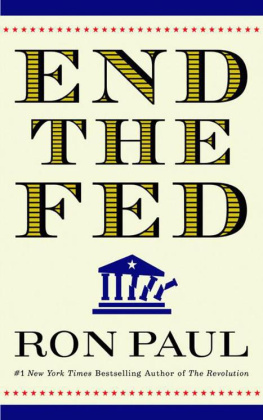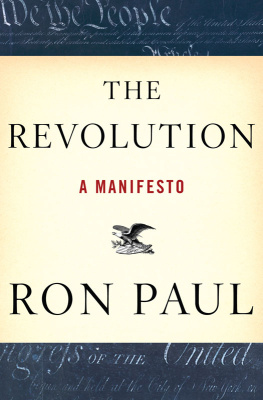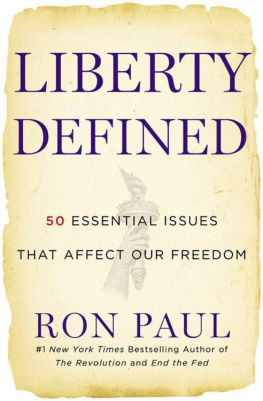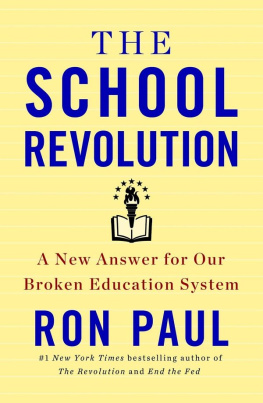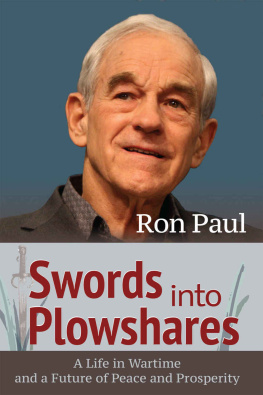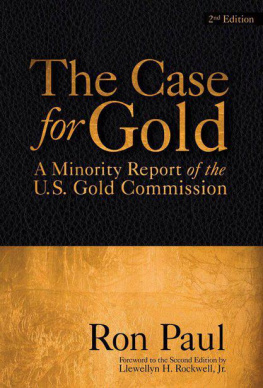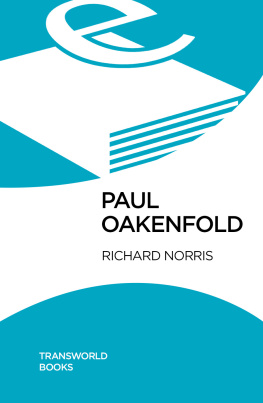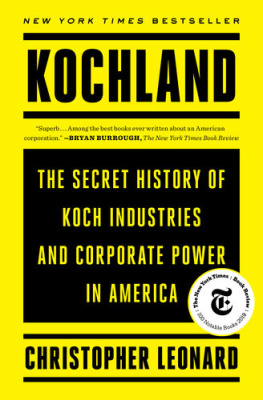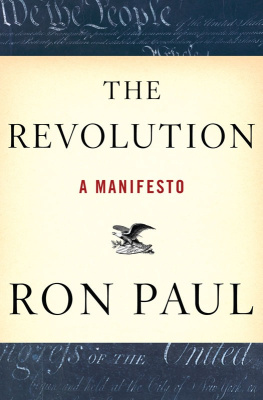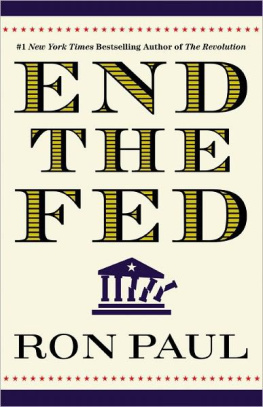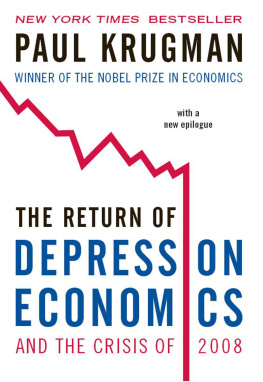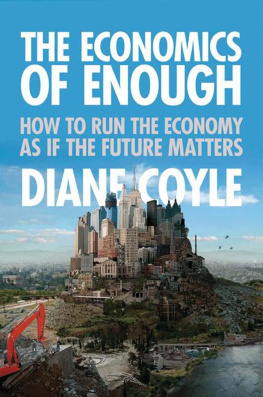Copyright 2009 by The Foundation for Rational Economics and Education, Inc. (FREE)
All rights reserved. Except as permitted under the U.S. Copyright Act of 1976, no part of this publication may be reproduced, distributed, or transmitted in any form or by any means, or stored in a database or retrieval system, without the prior written permission of the publisher.
Grand Central Publishing
Hachette Book Group
237 Park Avenue
New York, NY 10017
Visit our website at www.HachetteBookGroup.com.
www.twitter.com/grandcentralpub
First eBook Edition: September 2009
Grand Central Publishing is a division of Hachette Book Group, Inc.
The Grand Central Publishing name and logo is a trademark of Hachette Book Group, Inc.
ISBN: 978-0-446-56818-0
Contents
To the young people who powered my presidential campaign and who are the heart of the anti-Fed movement.
In your hands is the hope of a free and prosperous society.
My first thanks go to my wife, Carol, whose love and support make possible everything I do. And without my great teachers in Austrian economicsLudwig von Mises, Murray N. Rothbard, F. A. Hayek, Henry Hazlitt, and Hans F. Sennholzthis book would not exist.
Thanks also to my editor Ben Greenberg, for his most effective help.
E verybody thinks about money and almost everybody wants more. We use money without thinking much about its nature and function. Few of us ask where it comes from, who controls it, why it has value, or why it loses value from time to time.
In the same way, most people accept the Federal Reservethe manager of the nations money stockas an indispensable institution that the United States cannot function without, and so they dont question it. But I assure you, especially in this post-meltdown world, that it is irresponsible, ineffective, and ultimately useless to have a serious economic debate without considering fundamental issues about money and its quality, as well as the Feds massive role in manipulating money to our economic ruin.
What is the Fed and what does it do? To answer these questions, you can read books, study pamphlets issued by the Fed, or attend economics lectures at your local college. You can even consult the Feds comic books on its own Web site. You will be told how the Fed serves to stabilize the business cycle, control inflation, maintain a solvent banking system, regulate the financial system, and more. Certainly, the Feds spokes-men claim that they do all this and do it well.
I disagree on each point.
After all is said and done, the Fed has one power that is unique to it alone: it enables the creation of money out of thin air. Sometimes it makes vast new amounts. Sometimes it makes lesser amounts. The money takes a variety of forms and enters the system in various ways. And the Fed does this through techniques such as open-market operations, changing reserve ratios, and manipulating interest rates, operations that all result in money creation.
Given that money is one half of every commercial transaction and that whole civilizations literally rise and fall based on the quality of their money, we are talking about an awesome power, one that flies under cover of night. It is the power to weave illusions that appear real as long as they last. That is the very core of the Feds power.
As President Barack Obama said of the economic boom that went bust: I think its important to understand that some of that wealth was illusory in the first place.
Exactly.
But lets also understand the source of the illusion and what to do about it.
Of course, not everyone is instinctively against this illusion-weaving power, and many even welcome it. They just want to get back to the times when everything was good even though it was all just a miragea creation of the appearance of wealth by the Fed.
It is frequently thought that relieving an alleged shortage of money will solve all social problems. Even today, with an economic crisis raging, the response by our government and the Federal Reserve has been characteristic. Interest rates are driven to zero and trillions of dollars are pushed into the economy with no evidence that any problems will be solved. The authorities remain oblivious to the fact that they are only making our problems worse in the long run.
Economic booms and busts have been around for a long time. Tragically, the innocent who understand little about the complexity of the monetary system suffer the most, while those who are in the know reap great profits whether the market is going up or down. Only an understanding of how the monetary system works can correct this problem and protect the victims caught in a vicious economic downturn.
Everyone should have an intense interest in what money is and how its manipulated by the few at the expense of the many. Money is crucial for survival. It is necessary for maintaining a free society. A healthy economy depends on it. Limiting political power is impossible without it. Sound money is essential for preventing unnecessary wars. Prosperity and peace in the long run are impossible without it.
To understand money, one absolutely must understand what a central bank is all about. In the United States, the central bank is the Federal Reserve, the instrument by which our money and credit are constantly manipulated for the benefit of a privileged class.
Ive written this book to explain why I think the system of Fed domination must come to an end. Ive been speaking and writing on this subject for more than thirty years, but there was a time when hardly anyone cared what I had to say about this subject. The economic crisis has changed everything. Today there is a growing social movement, even a political movement, dedicated to ending the Fed.
In fact, the title of this book is not my own but rather comes from a slogan that can be heard at rallies all around the country. I first heard it at the University of Michigan in October 2007, after the Republican primary debate in Dearborn. It was a frustrating evening; all my opponents denied there was anything at all wrong with the economy or Bush administration policies. But afterward, I was able to speak to more than 4,000 students in the quad at Ann Arbor.
Im told that was a big turnout for a candidate. And it was a very friendly crowd, applauding my comments on government spending and deficits and on wars and foreign policy. But when I mentioned monetary policy, the kids started cheering. Then a small group chanted, End the Fed! End the Fed! The whole crowd took up the call. Many held up burning dollar bills, as if to say to the central bank, you have done enough damage to the American people, our future, and to the world: your time is up.
Then, in September 2008, at my counterconvention in Minneapolis, 12,000 people started the chant long before I even mentioned the issue of the Fed. I laughed and said, Wait a minute! But they did not, for money, its quality and future, is surely the issue of our times.
Ive always been an optimist about the cause of sound money, but even I never imagined that the anti-Fed cause would become material for popular protests in my lifetime. All around the country, people are gathering outside Federal Reserve buildings to protest against the power, secrecy, and operations of the Fed, and chanting this great slogan. Their goal is not reform but revolution: an end to the Fed.
Im thrilled. You should be, too, since ending the Fed would be the single greatest step we could take to restoring American prosperity and freedom and guaranteeing that they both have a future.
I have no doubt that some people consider such protests to be shocking, radical, even dangerous, but the truth is that they arise from an impulse deeply rooted in our nations history. The nineteenth century saw many similar protests against the national bank system and the attempt to centralize money and credit in a government-sponsored, government-backed institution that operates in complete secrecy.
Next page
